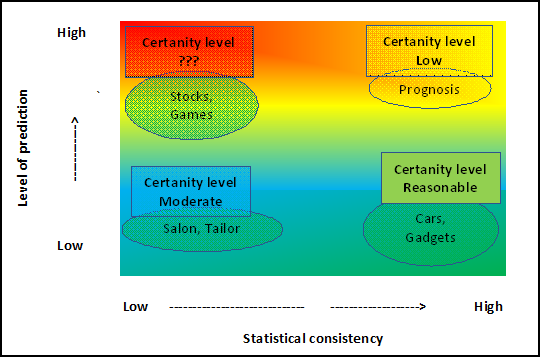Most people require help from experts in relevant fields and seek advice from consultants. However, expert advice from various sources on a particular topic may not be identical. Let’s look at a few examples.
If I were buying a new car or an electronic gadget, I would reach out to some of my friends who are ardent fans and know everything there is to know about these. I might also look up some online reviews. Reviews can be objective or without personal bias – this is an x litre engine that is well tuned or it has “y” processor with “z” GB ram that will give a certain level of performance. Or they can be subjective or with personal bias which includes their opinion of the product as well their understanding of my requirement.
An automobile or an electronic gadget is an engineered product that has a significant probability of performing according to expectations. (However, I must remember that well-reviewed and received products could also have some failures although it is quite improbable that I get a defective piece). The products discussed here have a high level of statistical consistency and hardly any speculation about the quality is required. The information from either source will provide a reasonable level of certainty, though, of course, there are no guarantees.
In another instance, I have moved into a new neighborhood and want to locate a service such as a hair salon or a tailor. I could choose a highly regarded service provider where I could expect consistency in performance, or I could ask a friend who I believe has similar expectations from the service as I do and use that establishment.
In the case of a service recommended by another, all experiences are not identical. Our choice is based on the assumption that the next transaction at the service provider we have chosen will tend to be at par with the experience of the other person. However, the choice based on another’s experience will have a lower level of statistical consistency (as it is gathered from a small data set) and there is a bit higher level of prediction involved in the review. This review will give me a moderate level of certainty, but we can agree that it is likely to be lower than the certainty in the review of a car or a gadget.
In yet another instance I have a medical condition and go to a doctor and ask for a prognosis. The doctor understands that the prognosis could take several paths with varying degrees of chance. For example, 20% of the patients could be cured completely, 30% of the patients could die, 25% could have no adverse symptoms for a 10-year period, 25% might need serious intervention ever y few months. The doctor might have a good understanding of my current condition but may not be able to predict how it will pan out in my case.
If the doctor picks any one scenario then there is a good chance that the condition may not progress in the manner predicted. Even if the doctor knows the entire probability spectrum, he/she may also feel obligated to present a more positive picture to me. The data has a high level of statistical consistency (as it is deduced from a large pool) but there is a much higher level of prediction involved in the review. This prognosis will give me a low level of certainty.
(PS: To get a better understanding of the way the medical condition may pan out, it is advisable to ask the doctor to explain the whole spectrum of possibilities rather than a prognosis in the specific case)
Finally, if I am planning to invest in stocks, I might consult a stock analyst. The analyst may understand the company and its fundamentals well and may also know the history of the stock price. However, this information might not have any predictive value for making the investment as the company may have excellent fundamentals but, if the stock is selling at a high price, I might not make a profit. The review is about the valuation of the company, which is basically what the market will value the company in the future, so there is a high degree of prediction involved in the analyst’s recommendation.
Similarly, if I want to predict the outcome of a cricket match, a cricketing expert may know the statistics of the historical matches and understand the relative strengths of the teams. If India is playing Zimbabwe, I might not ask the expert for a prediction. If India is playing either Australia or New Zealand, then the expert’s opinion on the outcome of a specific match will involve a high level of prediction. Experts may be better at predicting the outcome of a series of matches where knowledge of the game plays a better role, but predicting the outcome of a specific match is fairly difficult.
Therefore, recommendation about the outcome of a specific stock or a specific cricket match has low levels of statistical consistency and a high level of prediction. In this scenario consulting experts may not offer any certainty or, at the most, a very limited level of certainty.
In a nutshell, the “certainty” we can expect in a review from an expert will depend on the statistical consistency of the product or service they are reviewing as well as on the level of prediction involved in their recommendation.
I believe a good understanding of the impact of statistical consistency and levels of prediction will help us better evaluate recommendations from experts.
Happy Investing….
